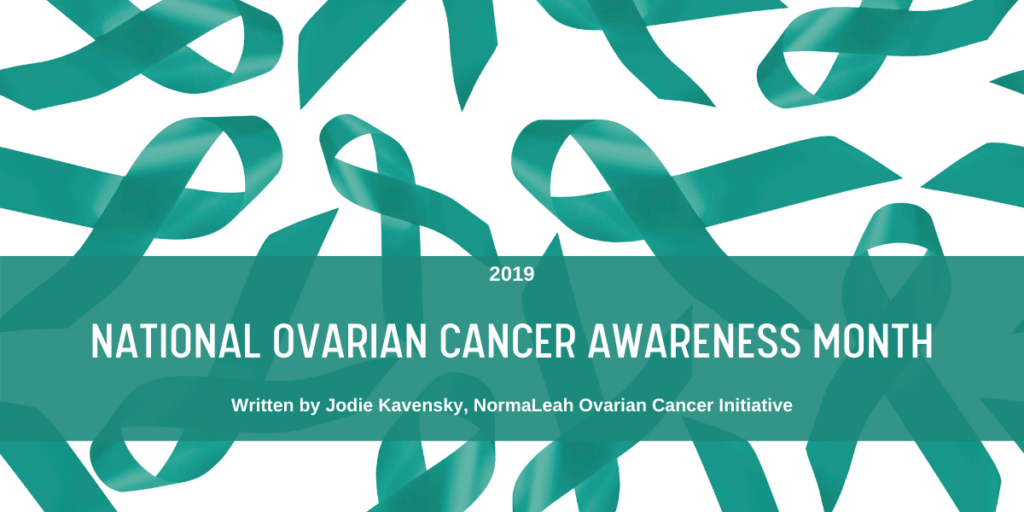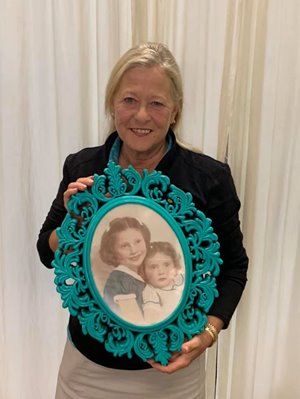September is National Ovarian Cancer Awareness Month

By: Jodie Kavensky, NormaLeah Ovarian Cancer Initiative
September is National Ovarian Cancer Awareness Month. Hopefully my words will resonate with someone who is or has been impacted by this disease. My life’s mission is to empower women to be vigilant self-advocates for their own health. I’m not a cancer survivor, but as a caregiver and pre-vivor, I have learned so much about a disease that is surrounded by silence.

Image: Jodie Kavensky, holding a photo of her mother and aunt.
Both my mother and her sister died from ovarian cancer. I inherited the BRCA2 mutation, increasing my risk for the disease as well as the risk for breast cancer. This knowledge is power because it allows me to take pro-active measures to reduce my risks and monitor my gynecologic health more closely, making me a pre-vivor.
Through my efforts, I have helped thousands of women experience a better quality of life, whether they are symptomatic or battling the disease. My mother’s dying wish was that I be a voice for all those (way too many) who have been silenced by ovarian cancer. So, I started the NormaLeah Ovarian Cancer Initiative in memory of my mother (Norma) and her sister (Leah).
My background in healthcare marketing has served me well on this journey of the past 10 years. There are severe knowledge gaps and rampant misconceptions when it comes to ovarian cancer. I hope to lessen that gap by educating women and their healthcare providers about the three biggest misconceptions regarding the disease:
- That there are no symptoms (THERE ARE)
- A pap test screens for ovarian cancer (IT DOES NOT)
- Women without ovaries cannot get ovarian cancer (THEY CAN)
BUSTNG MISCONCEPTIONS
Ovarian cancer DOES have symptoms. They are vague and fleeting and mimic many non-life-threatening conditions such as menopause, gastro-intestinal or urinary tract diseases. The symptoms are easy to ignore until they become acute. Since 2011, NormaLeah has distributed more than 500,000 mirror-mountable cards using the BEAT acronym. Bloating. Eating less/feeling fuller. Abdominal pain. Trouble with your bladder and bowels. Please, know the symptoms and know your daily habits.
A pap test screens for cervical cancer — not ovarian. There is no screening test for ovarian cancer, but there are diagnostic tests which can help detect it at an earlier stage for symptomatic and high-risk women. I have these tests done every year as part of an active surveillance plan. They include a CA125 blood test, transvaginal ultrasound and rectal-pelvic exam.
A 2017 study has shown that the most common form of ovarian cancer (there are more than 30 types) originates in the fallopian tubes. (www.cancer.gov/news-events/cancer-currents-blog/2017/ovarian-cancer-fallopian-tube-origins) So, even without ovaries, women CAN develop ovarian cancer. Norma was one of them. And because of my BRCA2 mutation, even though I’ve had my ovaries removed, my risk is almost twice as high as other women.
KNOW YOUR RISK. SEEK PROPER MEDICAL ATTENTION.
The biggest risk factors for ovarian cancer are advancing age (median age 63) and a history of familial cancers including breast, prostate, colo-rectal, uterine and pancreatic. If these types of cancer are prevalent in your family, I urge you to speak to a medical professional about genetic testing. The healthcare landscape is changing quickly and there are many options for reducing the risk of developing cancer and/or detecting it at an earlier stage. If you know your risk.
Please take a close look at your personal medical history, too. Several conditions can increase your risk. These include hormone replacement therapy, polycystic ovarian syndrome, endometriosis and not having children. Our “Sisterly Advice” educational sessions share this information (and more) including insurance concerns, risk-reduction strategies, additional symptomology, testing protocols and how to seek proper medical attention for the best possible outcome. It’s what Norma and Leah would tell women if they were still alive.
Which brings me to my last point . . . seeking proper medical attention. Research shows that women under the care of a gynecologic oncologist specialist have better clinical and oncological outcomes. (www.ncbi.nlm.nih.gov/pmc/articles/PMC4712269/) Gynecologic oncologists are usually found at large NCI-approved facilities (ie. University of Iowa). With a high percentage of rural areas, Iowa has recently been identified as a state where the survival rate could be significantly impacted if women were referred out to a specialist. Together with the Iowa Cancer Consortium, I am working to increase the number of women with access to these specialists.
Imagine how many women could have a better quality of life if they knew these truths. Please share this information with the women you know and love. Let’s put hope on their side. And, feel free to reach out to us at [email protected] if we can assist in any way.
